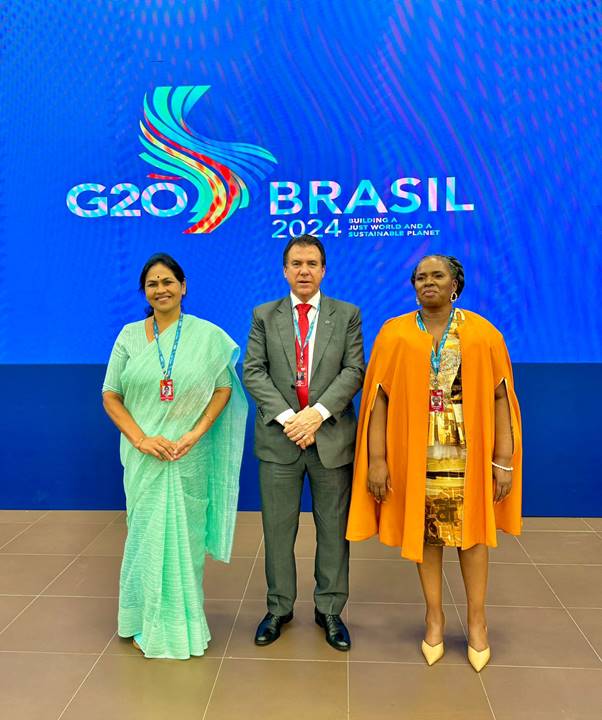G20 Labour Ministers Approve Declaration Focusing on Just Transition and Quality Jobs
The text emphasizes creating formal jobs and promoting decent work are the most effective social tools for achieving a fairer and more equitable income distribution.
Smt. Karandlaje stresses the need for skilling and reskilling to ensure just and fair transition to greener alternatives.
Union Minister of State for Labour & Employment outlines India’s achievement in leveraging technology as a means of improving everyone’s quality of life
The G20 Labour and Employment Ministers (LEMM) convened in Fortaleza, Brazil, have approved the Labour and Employment Ministerial declaration on July 26, 2024. The declaration was finalized after a two-day meeting under the Presidency of Brazil.
The Indian delegation was led by Minister of State for Labour & Employment, Shobha Karandlaje. Brazil, along with India and South Africa, represented the troika of the previous, current, and next host of the G20. The Labour & Employment Ministers’ meeting was preceded by the 5th Employment Working Group meeting (EWG) on July 23-24, which negotiated the final text.
During the two-day event, ministers discussed key focus areas of the Labour & Employment track, including Just Transition, the creation of quality jobs, promotion of decent work to ensure social inclusion and eliminate poverty and hunger, gender equality, and the use of technologies to improve everyone’s quality of life.
The declaration emphasizes the need for governments to develop and support active inclusion policies aimed at fostering strong, sustainable, balanced, and inclusive economic growth. It recognizes that creating formal jobs and promoting decent work are the most effective tools for achieving a fairer and more equitable income distribution. The declaration also stresses the need for effective labour market policies, such as skills development, access to training and lifelong learning, and job matching, aligned with the economy's needs and demands, in consultation with social partners. It urges governments to formalize jobs, respond appropriately to platform work, promote adequate wage floors, provide access to social protection, and promote social dialogue and collective bargaining.
In her opening remarks on ‘Just Transitions,’ Karandlaje emphasized the need for skilling and reskilling to ensure a fair transition to greener alternatives. “Just transitions encompass various dimensions, including protecting workers and communities affected by the phasing out of carbon-intensive industries. It requires a robust framework of social protection, retraining programs, and investments in sustainable industries. However, the shift to greener alternatives can lead to significant job losses and economic instability if not managed carefully,” she said.
Karandlaje highlighted India's efforts in creating National Missions in areas such as solar energy, energy efficiency, water, sustainable agriculture, health, the Himalayan ecosystem, sustainable habitat, green India, and strategic knowledge for climate change. She also noted the crucial role of the Sector Skill Council for Green Jobs (SSCGJ) in developing a skilled workforce for related sectors.
Discussing the creation of quality jobs and the promotion of decent work, Karandlaje informed that India generated over 80 million employment opportunities from 2017-18 to 2021-22, averaging over 20 million jobs per year. The youth unemployment rate dropped from 17.8% in 2017-18 to 10% in 2022-23, with increased youth participation in the labour force. She also mentioned India's 'One Nation, One Ration Card' initiative, which allows migrant workers to access food grains nationwide, and the Ayushman Bharat Scheme, covering over 550 million citizens.
On 'Gender Equality and Promotion of Diversity in the World of Work,’ Karandlaje highlighted India's legislative measures promoting gender equality, including the Sexual Harassment of Women at Workplace Act, 2013, the Equal Remuneration Act, 1976, and the extension of paid maternity leave from 12 weeks to 26 weeks for women employees.
During the session on ‘the use of technologies as a means of improving everyone’s quality of life,’ Karandlaje showcased India's Digital India Mission and the e-Shram portal, which has registered over 298 million informal sector workers. She also highlighted Aadhaar's role in financial inclusion and urged G20 countries to address ethical considerations related to technology, including data privacy, cybersecurity, and the ethical use of AI.
On the sidelines of the meeting, Karandlaje met with Gilbert Houngbo, Director General of the International Labour Organization (ILO), and Japanese State Minister for Health, Labour and Welfare, Miyazaki Masahisa, to discuss areas of mutual interest, including enhancing the mobility of semi-skilled and skilled workers from India to Japan.


